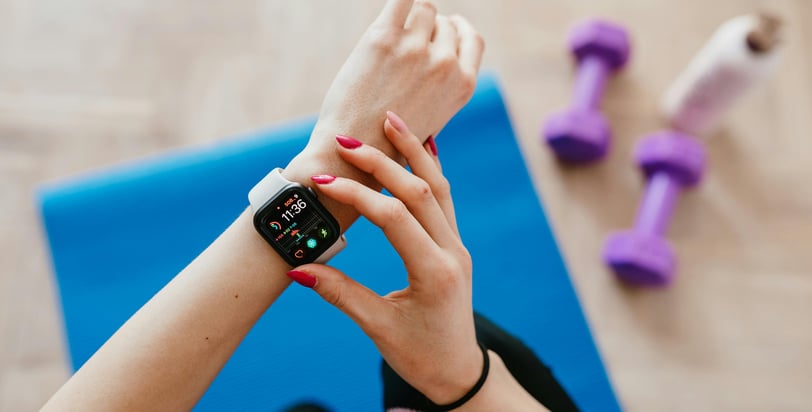Wearable Technology for Health
Review the latest wearable devices and apps designed to track and improve health metrics
HEALTH
Yasin Niyas
7/24/20245 min read


In today's fast-paced world, staying on top of your health has never been easier, thanks to the evolution of wearable technology. These devices are revolutionizing how individuals monitor and manage their well-being, offering real-time insights and personalized data that empower users to make informed decisions about their lifestyles. This article explores the latest advancements in wearable devices and accompanying health-tracking apps, providing a comprehensive guide to integrating technology seamlessly into your health routine.
Introduction
Wearable technology has emerged as a game-changer in the realm of personal health management. From smartwatches that track heart rate and sleep patterns to fitness bands that monitor physical activity, these devices offer unparalleled convenience and actionable insights. This article delves into the diverse landscape of wearable health technology, highlighting the benefits, functionalities, and considerations for selecting the right device and app combination to support your health goals.
Review of Wearable Devices
The market for wearable health technology has exploded with a diverse range of devices catering to various health metrics and user preferences.
1. Apple Watch Series 7
The Apple Watch Series 7 continues to dominate the market with its sleek design and robust health features. It offers comprehensive tracking of heart rate, blood oxygen levels, and ECG readings. The latest model also introduces a larger display and faster charging capabilities, making it a versatile companion for everyday health monitoring.
Pros:
- Stylish design with customizable watch faces.
- Advanced health sensors for accurate tracking.
- Integration with Apple Health app for holistic health management.
Cons:
- Limited compatibility with Android devices.
- Higher price point compared to other options in the market.
2. Fitbit Charge 5
Fitbit remains a favorite among fitness enthusiasts for its user-friendly interface and reliable tracking capabilities. The Fitbit Charge 5 features continuous heart rate monitoring, sleep tracking, and guided breathing sessions. It also offers built-in GPS and is water-resistant, catering to users with active lifestyles.
Pros:
- Long battery life (up to 7 days).
- Compatibility with both Android and iOS devices.
- Affordable price point compared to premium smartwatches.
Cons:
- Limited app ecosystem compared to competitors like Apple Watch.
- Display may be smaller for users accustomed to larger screens.
3. Garmin Venu 2
For outdoor enthusiasts and athletes, the Garmin Venu 2 stands out with its comprehensive fitness tracking capabilities. It offers advanced metrics such as VO2 max, hydration tracking, and built-in sports apps for running, cycling, and swimming. The AMOLED display provides vibrant visuals even under sunlight, enhancing readability during outdoor activities.
Pros:
- Extensive fitness tracking features tailored for sports enthusiasts.
- Offline music storage and playback.
- Garmin Coach feature for personalized training plans.
Cons:
- Higher price point, particularly for premium models with music storage.
- Complex interface may require a learning curve for new users.
4. Samsung Galaxy Watch 4
Samsung's Galaxy Watch 4 series combines sleek design with powerful health tracking features. It includes advanced sensors for monitoring heart rate variability, blood pressure, and electrocardiogram (ECG) readings. The watch also integrates seamlessly with Samsung Health app and offers compatibility with both Android and iOS devices.
Pros:
- Stylish design with customizable watch faces.
- Enhanced health sensors for comprehensive monitoring.
- Integration with Samsung Health ecosystem for seamless data management.
Cons:
- Limited third-party app support compared to other platforms.
- Battery life may vary depending on usage and features enabled.
Review of Health Tracking Apps
While wearable devices provide real-time data, health tracking apps extend functionality by offering detailed insights, goal setting, and integration with other health metrics.
1. MyFitnessPal
MyFitnessPal remains a popular choice for calorie tracking, meal planning, and nutrition analysis. The app syncs seamlessly with wearable devices to consolidate data on physical activity, food intake, and weight management goals. Users can set personalized targets and track progress over time, fostering accountability and informed decision-making.
2. Strava
Focused on fitness enthusiasts, Strava combines social networking with performance tracking for running, cycling, and swimming. The app utilizes GPS to map routes, record workouts, and analyze performance metrics such as speed, elevation gain, and heart rate zones. Strava also offers challenges and community events to motivate users and foster a sense of community.
3. Sleep Cycle
Optimizing sleep is crucial for overall health, and Sleep Cycle offers insights into sleep patterns and quality. The app uses sound analysis to monitor sleep stages and wake users during the lightest sleep phase, promoting a more refreshed wake-up experience. Sleep Cycle integrates with wearable devices to correlate sleep data with daily activities and habits for comprehensive health tracking.
4. Headspace
Beyond physical health, mental well-being is equally important. Headspace offers guided meditation sessions and mindfulness exercises designed to reduce stress, improve focus, and enhance overall mental resilience. The app complements wearable technology by promoting holistic wellness through regular meditation practice and relaxation techniques.
Comparison and Recommendations
When choosing a wearable device and health tracking app, consider your specific health goals, lifestyle preferences, and budgetary constraints. Here are some recommendations based on different user profiles:
- For Comprehensive Health Tracking: The Apple Watch Series 7 excels in providing a holistic approach to health monitoring with its advanced sensors and seamless integration with the Apple ecosystem.
- For Fitness Enthusiasts: The Garmin Venu 2 offers extensive fitness tracking features and robust sports modes, making it ideal for athletes and outdoor adventurers.
- For Budget-Conscious Users: The Fitbit Charge 5 strikes a balance between affordability and functionality, offering essential health metrics and long battery life.
- For Android Users: Consider the Samsung Galaxy Watch 4, which combines stylish design with powerful health monitoring features and seamless integration with Samsung Health app.
Best Health Tracking App: MyFitnessPal stands out for its versatility in nutrition tracking and goal setting, complementing any wearable device with its comprehensive health insights.
Conclusion
Wearable technology has revolutionized how we approach health management, offering unprecedented access to real-time data and personalized insights. Whether you're tracking daily steps, monitoring heart health, or optimizing sleep patterns, these devices and apps empower users to take proactive steps towards better health outcomes. By integrating wearable technology into your lifestyle, you can make informed decisions, set achievable goals, and embark on a journey towards improved well-being. Embrace the future of health management with wearable technology—it's more than just a gadget; it's your partner in health.
Looking Ahead
As technology continues to advance, the future of wearable health devices holds even greater promise. Innovations in artificial intelligence, predictive analytics, and wearable sensors are poised to further enhance the accuracy and utility of these devices, providing users with even deeper insights into their health metrics and behaviors. By staying informed and embracing technological advancements, individuals can harness the full potential of wearable technology to lead healthier, more empowered lives.
Ethical Considerations and Privacy
While wearable technology offers numerous benefits, including enhanced health monitoring and personalization, it also raises important ethical considerations regarding data privacy and security. Users should be vigilant about sharing sensitive health information and ensure that devices and apps comply with stringent data protection regulations. As the adoption of wearable technology grows, industry stakeholders must prioritize transparency and accountability in handling user data to maintain trust and uphold ethical standards.
Accessibility and Inclusivity
Innovations in wearable technology should strive for inclusivity by considering diverse user needs and accessibility requirements. This includes designing devices and apps that accommodate users with disabilities, ensuring usability and functionality across different demographics. By fostering an inclusive approach to technology development, wearable devices can truly empower all individuals to manage their health effectively and equitably.
Community and Support Networks
Beyond individual use, wearable technology has the potential to foster community engagement and support networks. Platforms like social media and dedicated health forums enable users to share experiences, seek advice, and celebrate achievements with like-minded individuals. By leveraging community-driven support networks, wearable technology not only promotes personal health but also cultivates a sense of belonging and mutual encouragement among users worldwide.
This article aims to provide a comprehensive overview of wearable technology for health, covering a wide range of devices, apps, ethical considerations, and future trends. By delving deeper into each aspect—from device reviews to ethical implications—the content aims to educate and empower readers in making informed decisions about integrating wearable technology into their health and wellness journey.


Beauty
Explore the latest trends in health and beauty industry.
Health
Contact
contact@healthenaura.com
© 2024. All rights reserved.
